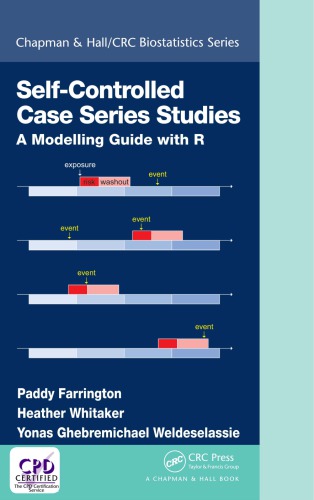Product desciption
Selfcontrolled Case Series Studies A Modelling Guide With R Farrington by Farrington, Paddy; Ghebremichael Weldeselassie, Yonas; Whitaker, Heather 9780429491313, 9780429957536, 9781498781596, 042949131X, 042995753X, 1498781594 instant download after payment.
""The self-controlled case series (SCCS) is one of the most important self-controlled designs in observational research, but has often been misunderstood and even misapplied. This book, written by the team that has led the development of the SCCS from the beginning, is an essential guide to all aspects related to this method." Dr. Martijn Schuemie, OHDSIThis book provides the first comprehensive account of the self-controlled case series (SCCS) method, a statistical method for investigating associations between outcome events and time-varying exposures. The method only requires information from individuals who have experienced the event of interest, and automatically controls for multiplicative time-invariant confounders, even when these are unmeasured or unknown. It is increasingly being used in epidemiology, most frequently to study the safety of vaccines and pharmaceutical drugs. Key features of the book include:A thorough yet accessible description of the SCCS method, with mathematical details provided in separate starred sections.Comprehensive discussion of assumptions and how they may be verified. A detailed account of different SCCS models, extensions of the SCCS method, and the design of SCCS studies. Extensive practical illustrations and worked examples from epidemiology. Full computer code from the associated R package SCCS, which includes all the data sets used in the book. The book is aimed at a broad range of readers, including epidemiologists and medical statisticians who wish to use the SCCS method, and also researchers with an interest in statistical methodology. The three authors have been closely involved with the inception, development, popularisation and programming of the SCCS method."--Provided by publisher.
Abstract: ""The self-controlled case series (SCCS) is one of the most important self-controlled designs in observational research, but has often been misunderstood and even misapplied. This book, written by the team that has led the development of the SCCS from the beginning, is an essential guide to all aspects related to this method." Dr. Martijn Schuemie, OHDSIThis book provides the first comprehensive account of the self-controlled case series (SCCS) method, a statistical method for investigating associations between outcome events and time-varying exposures. The method only requires information from individuals who have experienced the event of interest, and automatically controls for multiplicative time-invariant confounders, even when these are unmeasured or unknown. It is increasingly being used in epidemiology, most frequently to study the safety of vaccines and pharmaceutical drugs. Key features of the book include:A thorough yet accessible description of the SCCS method, with mathematical details provided in separate starred sections.Comprehensive discussion of assumptions and how they may be verified. A detailed account of different SCCS models, extensions of the SCCS method, and the design of SCCS studies. Extensive practical illustrations and worked examples from epidemiology. Full computer code from the associated R package SCCS, which includes all the data sets used in the book. The book is aimed at a broad range of readers, including epidemiologists and medical statisticians who wish to use the SCCS method, and also researchers with an interest in statistical methodology. The three authors have been closely involved with the inception, development, popularisation and programming of the SCCS method."--Provided by publisher


